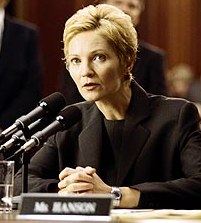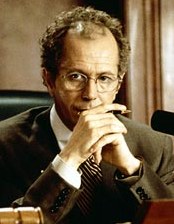| The Contender |
| |
 |
USA/France, 2000. Rated R. 126 minutes.
Cast:
Joan Allen, Gary Oldman, Jeff Bridges, Sam Elliott, Christian Slater,
William L. Petersen, Saul Rubinek, Mike Binder, Robin Thomas, Philip Baker
Hall, Mariel Hemingway, Kathryn Morris, Kristen Shaw
Writer: Rod Lurie
Music: Larry Groupé
Cinematographer: Denis Maloney
Producers: Willi Bär, Marc Frydman, James Spies, Douglas Urbanski
Director: Rod Lurie
LINKS
|
| Grade:
B |
Review and analysis by Carlo
Cavagna |
Note: Four paragraphs of this review analyze the ending and
contain major spoilers. They are clearly marked. If you have not yet
seen this movie and intend to do so, we strongly recommend you skip those paragraphs
and read them after you've seen the movie.
 n
political thrillers, Hollywood uses the same shorthand over and over. The sleazy,
two-faced politician is typically portrayed with his pants down, having sex
with some pretty young thing when he's supposed to be a hardworking family man
tending to the nation's business. That's how Senator Lane Hanson is introduced
in The Contender, having sex in the office when The Call comes from the
President. The difference is that Lane Hanson is a woman. By introducing her
with her skirt up, writer/director Rod Lurie surely intends her to be a negative
figure. Not so. Lurie confounds our expectations: Hanson is the most noble figure
in the movie–implausibly noble by the end, in fact. The Contender eventually
reaches too far, partially undermining its own effectiveness, but it is still
a solidly entertaining, even thought-provoking film.
n
political thrillers, Hollywood uses the same shorthand over and over. The sleazy,
two-faced politician is typically portrayed with his pants down, having sex
with some pretty young thing when he's supposed to be a hardworking family man
tending to the nation's business. That's how Senator Lane Hanson is introduced
in The Contender, having sex in the office when The Call comes from the
President. The difference is that Lane Hanson is a woman. By introducing her
with her skirt up, writer/director Rod Lurie surely intends her to be a negative
figure. Not so. Lurie confounds our expectations: Hanson is the most noble figure
in the movie–implausibly noble by the end, in fact. The Contender eventually
reaches too far, partially undermining its own effectiveness, but it is still
a solidly entertaining, even thought-provoking film.
The idea is that the elected Democratic vice-president has died, and the president
(Jeff Bridges), who is nearing the end of his second term, is worried about
his "legacy" and place in history. Thus he passes over the most obvious candidate,
Senator Hathaway (William L. Petersen), who is something of a national hero,
and decides to appoint a woman to the vice presidency.
Right off the bat, Lurie's premise challenges political correctness, taking
on the issue of "quotas" and affirmative action. Breaking the gender barrier
at the top levels of government is obviously desirable, but the president seems
to be choosing Hanson because she is the best woman for the job, not because
she is the best person for the job. Republican Congressman Shelly Runyon
(Gary Oldman), Chairman of the House Judiciary Committee and a friend of Hathaway,
is appalled. He announces to his associates that he will not go easy on Hanson
during the confirmation hearings. In fact, he is determined to bring her down,
and he is joined in the effort by ambitious young Democratic Congressman Reginald
Webster (Christian Slater). Runyon wields a potent weapon, a story that Hanson
once engaged in public group sex while in college, with photographs of the alleged
incident. Will Hanson fend off the attack, or will she meekly wash out of the
confirmation process?
Lurie builds the suspense without calling on political-thriller cliches. There
are no black helicopters, no chase scenes, no government agents in unmarked
cars following people around, and no sneaking into private offices to copy computer
files frantically before being discovered. In fact, there's no action whatsoever.
Like in his previous film Deterrence (a tiny indie no one saw), Lurie
relies exclusively on conversations to build his story. Lurie has an ear for
conversational exchanges, and he's clearly watched the Clarence Thomas/Anita
Hill hearings a few times. Because the writing is so sharp, Lurie has no need
to resort to slick editing. The drama is in the words, and Lurie relies on the
audience to pay attention.
The Contender has a point to make: women in public office are held to
unreasonable standards of behavior and have to answer questions that men are
never asked. At first Runyon's reason for opposing Hanson appears to be just
what he says it is: an honest belief that there are better people for the job.
It soon becomes obvious that Runyon's motives are shaped by a deep, abiding
misogyny. Throughout the hearings, he uses Hanson's sexuality and womanhood
against her, transparently trying to embarrass her while pretending to be friendly.
It's an effective strategy. In order to be taken seriously in Washington, women
are required to be practically antiseptic, asexual creatures. Lane Hanson is
not. This makes things extremely difficult for her. Making matters worse, Hanson
absolutely refuses to respond to any accusations regarding her personal life.
Even to deny the charges, she believes, is a tacit acknowledgment that it's
all right to make the accusations in the first place. Her nomination seems doomed.
That's when serious plot difficulties begin to appear. [SPOILERS begin
here:] Because of the larger point he wants to make, Lurie won't allow
his heroine to defend herself. To get to a happy ending, he must find some other
way for Hanson to prevail. The contrivances he uses clash with the realism of
the rest of the film. Eventually it comes out that Hathaway faked his heroic
act and even caused the death of the person he was supposedly trying to save.
How convenient! And how unlikely! Only a colossal moron would attempt a stunt
like the one Hathaway attempts, but no one advances as far as Hathaway has by
being a colossal moron. (Well, ok, Dan Quayle did.)
Hathaway's fiasco removes the most likely alternative to Hanson and embarrasses
Runyon, but Hanson doesn't win by default. The accusations against her are still
out there, and so she finally withdraws her name from consideration. To carry
the day for righteousness, Lurie caps the film with Big Speech by the President,
complete with the sound of swelling horns in the background. In his speech,
the President takes Congress to task for its unfairness, refuses to accept Hanson's
attempt to abandon the field, and demands her immediate confirmation via a public
roll call vote. The tone of the scene is so different from the rest of the film
that one has to wonder if it was added later, after the film had been test screened
a few times. The Contender might have been more provocative had it simply
ended with the previous scene, in which Hanson accepts her failure. In Deterrence,
Lurie had the luxury of ending the film ambiguously, with a seemingly sympathetic
protagonist having precipitously committed to a probably unjustifiable course
of action. But big studio budgets require clear and happy endings.
In addition to the implausibilities, a problem with The Contender's
logic emerges at the end. Lurie tries to make Hanson so noble a figure that
he finally reveals that the person in the photographs is not her, and that the
proof is the lack of a birthmark on the woman's thigh. No one in the film other
than the President ever learns this. Perhaps it is noble to refuse to respond
to inappropriate allegations, but it's not noble to refuse to point out a basic
fact. It's stupid. Hanson has to be bailed out by the President when she could
have bailed herself out. Noting that the woman in the photos is someone else
in no way would have undermined Hanson's basic position that she is the victim
of a double standard. We, the audience in the real world, are meant to be overawed
by Hanson's noble stance, but the fictitious general public in The Contender
has no knowledge of her sacrifice. In the absence of other data, the public
would almost certainly assume that Hanson's refusal to deny the charges means
they are true. Lurie has made his point to moviegoing audiences, but has Hanson
won the battle in the hearts and minds of the public in the movie? Has she really
convinced them that Runyon's accusations are out of line regardless of whether
they are true or false? Lurie tries to address this possible deficiency with
the president's speech, but it doesn't seem like enough.
Come to think of it, why couldn't Lurie have allowed the accusations against
Hanson to be true, or at least left them unanswered? After all, Lurie is trying
to convince us that the sex lives of our political leaders should be irrelevant.
If this is his belief, why doesn't he trust that audiences would see Hanson
as noble if it were to turn out that she really did have public group sex? [End
SPOILERS]
AboutFilm.Com
The Big Picture
|
| Alison |
-
|
| Carlo |
B
|
| Dana |
B-
|
| Glenn |
-
|
| Jeff |
C-
|
| Kris |
-
|
| ratings explained |
Fortunately, the acting is so brilliant that it carries the film past most
of its flaws. Some Academy Award™ nominations are in order here. Bridges, the
erstwhile Dude of The Big Lebowski, is far more presidential than one
might expect and gives a fine performance, even if he does sometimes look and
sound like he has marbles in his mouth. The president's attempts to confound
the White House chef by ordering bizarre foods provide some light comic relief.
Bridges shifts between these comic moments and more serious scenes smoothly,
and almost makes his Big Speech believable–almost. Sam Elliot is an even greater
pleasure as the president's straight-shooting Chief of Staff. Just in case anyone
had forgotten after a series of hammy I'm-just-doing-this-for-the-money bad-guy
roles in movies like The Fifth Element and Lost
in Space, Gary Oldman again shows that he can merge completely with
his character. In his right-wing persona with extremely bad hair, he's almost
unrecognizable.
Any of these characters could easily have become political caricatures like
Richard Dreyfuss' villainous Bob Rumson in The American President or
John Travolta's over-the-top Jack Stanton in Primary
Colors, but the actors resist stepping over the line into parody. Philip
Baker Hall and Mariel Hemingway also appear in strong cameo roles. Christian
Slater is the only bad casting decision–neither the actor nor the character
he plays belong in the movie. Webster is too obviously a story device, and there's
absolutely nothing about Slater that says, "I'm a legislator." Slater doesn't
even look like someone who would be named Reginald Webster.
The Contender boasts many outstanding performances, but it is Joan Allen
who shines brightest. Her role is not as flashy as some of the others, but she
carries the film, projecting just the right amount of strength or vulnerability
at precisely the right moments. This is her movie. It's odd that Gary Oldman
gets top billing. Isn't The Contender supposed to be about gender discrimination?
They should have put Allen's name first where it belongs, in great big blinking
neon letters ten feet high.
Review
© October 2000 by AboutFilm.Com and the author.
Images © 2000 DreamWorks LLC. All Rights
Reserved.


